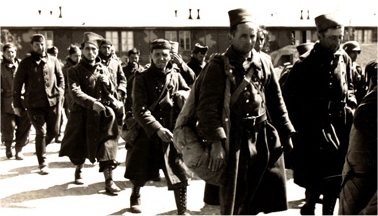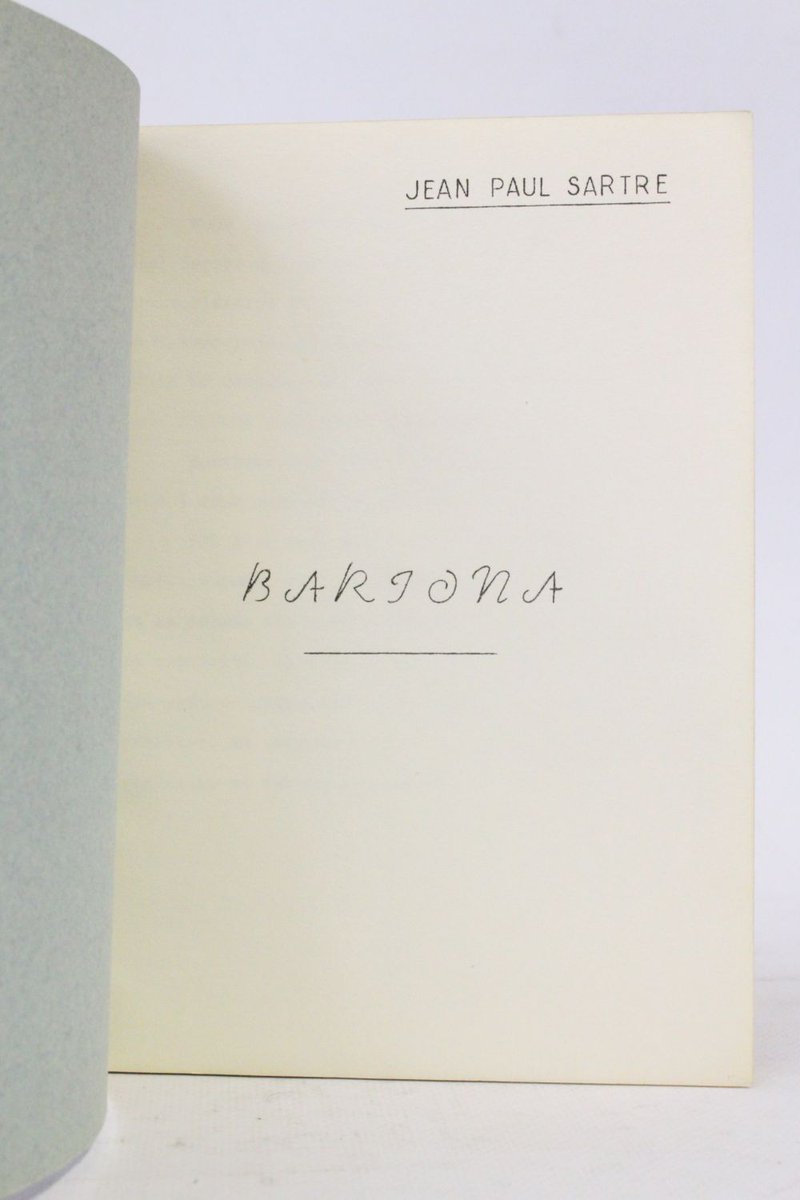Every so often at Christmas a piece comes out about Sartre’s play, Bariona. It was his first play, and it is an intriguing one: during his lifetime, it was performed only once, at Christmas 1940 in the Stalag XII D camp where he was prisoner of war, near Trèves. THREAD 

Sartre kept it rather closeted, refusing to allow its performance. It was eventually published in 1962, in a private printing of 500 copies (at the request of fellow POWs), and again privately in 1967. An English translation was published in 1970.
It is also intriguing because, as one of Sartre’s closest companions in the Stalag, Marius Perrin, remarked, even if the play is not ‘Christian properly speaking, it unfolds in the context of the Christmas story’. It stands in the tradition of medieval mysteries, with angels,
shepherds and wise men. So why did one of the twentieth century’s most prominent atheists write a Nativity play? Should we be surprised that he did? Opinion pieces trade on the assumption that we should, but I think not.
Sartre’s use of the powerful mythology of the Christmas
Sartre’s use of the powerful mythology of the Christmas
story fulfilled 2 important criteria: boosting morale & passing the censor. Sartre wanted a setting to unify 4,500 prisoners, who needed hope at a time when they could not celebrate Christmas with loved ones—whether their traditions were secular or religious, they were lost.
In addition to serving that purpose, the story of the birth of Christ provided a distance which meant that, in a Nazi prison camp where an outright denunciation of fascism would not have escaped the censors, a message of resistance and hope could nonetheless be conveyed.
So there are 2 reasons, for a start, not to be surprised that one of the 20thC’s most famous atheists wrote a Christmas play. But there is a further one: Sartre’s & Beauvoir’s works (philosophical & literary) were written to speak to multiple philosophical & political audiences.
Theirs was not an age of preaching to the choir. Take Beauvoir’s Pyrrhus and Cineas, for example: it opens with a discussion of Candide and Christ, because she thought both laïque humanists and Christians could learn from what she had to say—and she had learned from both herself.
It’s tempting to think that rumours circulate about Bariona because the text itself has not circulated widely: it makes it easy to claim: "Sartre was tempted by Christianity!" "Sartre converted to messianism!" Sartre faced these claims and more during his lifetime, partly because
he chose to write in polyphonic literary forms. The plurality of voices in a play renders it difficult – if, indeed, it is possible – to isolate the voice of the author. Bariona illustrates this problem par excellence. Like Les Mouches, Huis Clos, and Les Troyennes,
the action of Bariona unfolds within the space of 24 hours. It opens in the home of a first-century tax collector in the Roman-occupied promised land; he has just received the Super-Resident, who is is travelling through this (as he sees it) cultural backwater
– a land of sorcerers with a "belly full of Messiahs" – to collect census data & inform Rome’s local representatives that taxes are increasing.
Bariona, the leader of the village of Bethaura (near Bethlehem), is a disillusioned man, whose faith in justice has been shattered.
Bariona, the leader of the village of Bethaura (near Bethlehem), is a disillusioned man, whose faith in justice has been shattered.
On hearing the Super-Resident’s message, he protests that Bethaura – with an aging populace & little arable land – cannot bear the weight.
He concludes that the only way to resist evil in this world is to stop bearing children, to say no to birth in order not to say yes to life.
He concludes that the only way to resist evil in this world is to stop bearing children, to say no to birth in order not to say yes to life.
I’ve written about this play elsewhere so I won’t repeat my reading here (if you're interested, or if you want footnotes, it's in pp. 190-196 of this book). https://global.oup.com/academic/product/sartre-on-sin-9780198811732?cc=gb&lang=en&#
But I will share a part that I think is worth reflecting on at the end of 2020. One of the wise men, Balthazar (the character played by Sartre in the 1940 production) addresses Bariona. Balthazar enjoins him, despite his despair, to hope. He should hope, Balthazar says, because:
"when God fashioned the nature of man, he melted together hope and anxiety. For man, you see, is always more than he is. You see that man there, his flesh is solid, rooted to the ground by two large feet and you say, stretching out your hand to touch him: he is there.
But that is not true: Wherever a man may be, Bariona, he is always elsewhere."
I, for one, want to be “always elsewhere” (whatever that means) somewhere else. I want to stretch out my hands to touch others and be there with them. I miss my old possibilities.
I, for one, want to be “always elsewhere” (whatever that means) somewhere else. I want to stretch out my hands to touch others and be there with them. I miss my old possibilities.
But while I wait I will hope & act for (among many more urgent things) a world where respecting beliefs or traditions that are not one's own—enough to learn about & imaginatively inhabit them—might not be considered newsworthy, or misconstrued for the sake of making it seem so.

 Read on Twitter
Read on Twitter



